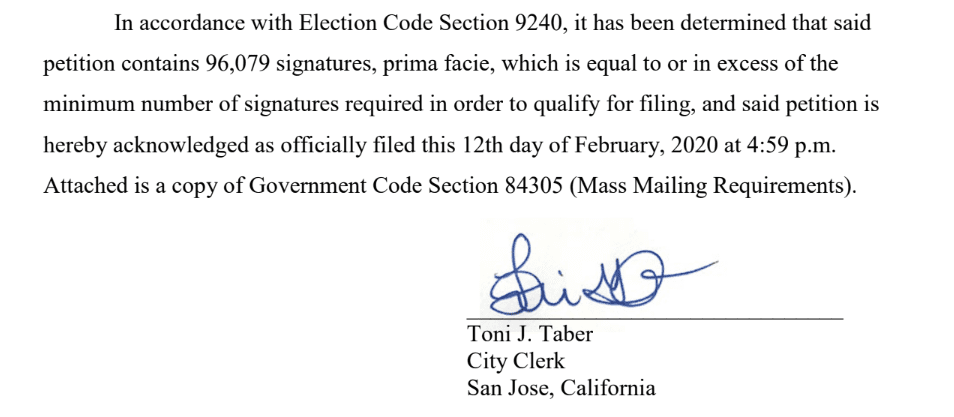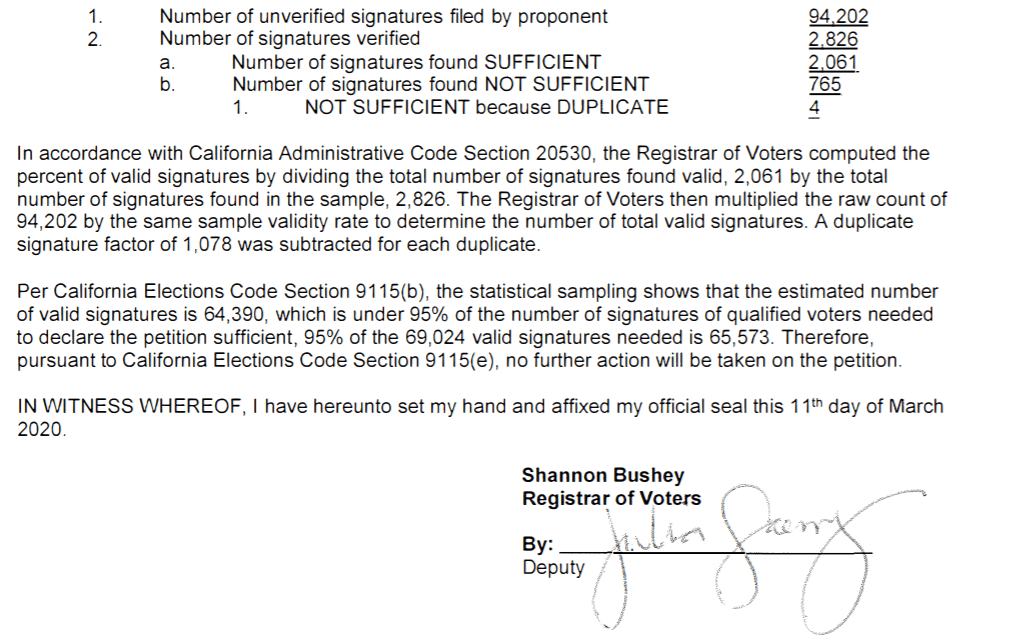A citywide measure to shift mayoral elections to presidential years and prohibit certain campaign contributions has failed to qualify for the November ballot, but labor leaders are questioning the process and claiming nearly 2,000 voter signatures went missing.
Last month, labor officials delivered nearly 100,000 signatures to San Jose City Hall to qualify the initiative. But they say at least 243 petition sheets — which could contain up to nine signatures per sheet — are missing. That amounts to at least 1,877 signatures they say are unaccounted for.
In a memo this week, San Jose City Clerk Toni Taber said she delivered the signatures — in sealed boxes — to the county Registrar of Voters on Feb. 14 to conduct a random sample to verify the signatures, a required step before any measure can go to the ballot. The county elections office must examine a random sample of at least 500 or 3% of the total signatures — whichever is greater — according to election law.
At least 95% of the signatures must be valid for the measure to move forward. For this initiative, that meant 65,573 signatures needed to come from qualified voters.
According to Taber, only 64,390 of the submitted signatures were valid — falling short of the 95% threshold by 1,183 signatures. The measure won’t be placed on the ballot this year, she confirmed.
Labor leaders produced a receipt from Taber showing they turned in 96,079 signatures on Feb. 12. But the Registrar of Voters reported receiving 94,202 signatures about a month later from Taber’s office — a shortage of 1,877 signatures. Similarly, the measure’s backers say they submitted 14,894 petition sheets to Taber, but the county elections office reported receiving 14,651 sheets.




“Finding these missing signatures is critically important to ensuring a fair count to determine if our measure qualifies for the ballot,” said Brenda Rodriguez, a spokesperson for the South Bay Labor Council, which authored the measure. “As it stands now, we have been informed by the Santa Clara County Registrar of Voters that our initiative does not qualify to be placed on the ballot given the results of a 3 percent sample.”
Rodriguez said the labor council is exploring all options, including potential legal remedies, to ensure voters’ voices are heard.
Taber told San José Spotlight that every petition submitted to her office was handed over to the Registrar of Voters. Her team’s main focus, she said, was to ensure the advocates had more than the minimum signatures required.
“Is it possible we miscounted? Yes. Staff bundles into stacks of 100 and then we count the stacks. After 12 hours of signature counting, it’s possible some stacks had more or less than 100,” Taber added. “If the proponents had known how many they were submitting and our count was off from theirs, we would have had a reason to double check the count at that time.”
Registrar of Voters Shannon Bushey said her office verified the number of pages and signatures four times while processing the petition.
“We have also searched the petition processing area and storage room twice and no additional petition pages were found,” Bushey said. “We are confident in our reported numbers.”
The measure had gained support from top politicians across the region including Congressmembers Zoe Lofgren, Ro Khanna and Anna Eshoo as well as State Senators Jim Beall and Bob Wieckowski and Assemblymembers Evan Low, Ash Kalra and Kansen Chu.
Dubbed the Fair Elections Initiative, the proposal would have moved the San Jose mayor’s election to presidential years — a move backers say would boost voter turnout, particularly among minorities and communities of color. This could have led to more diversity in the mayor’s race, they said.
“I’m disappointed,” said Garrick Percival, associate political science professor at San Jose State University and an advocate for the measure. “I think this would have been a positive change for the city to make our democracy stronger and more representative. We’ll have to continue to find ways to try to do that.”
Percival, who along with his wife wrote an op-ed for this news organization detailing the benefits of moving mayoral elections, said he doesn’t believe the idea will go away, even though voters won’t see it on their ballots this year. Percival said the measure might come back to the City Council, particularly if the labor movement can flip control of the 11-member council.
In April, San Jose’s council rejected the measure in a split 6-5 vote, favoring Mayor Sam Liccardo and his business-friendly colleagues who opposed it. But now labor leaders have a chance to pluck off at least one of those votes — by unseating District 4 Councilmember Lan Diep, who faces a tough re-election battle in November against Berryessa School Board Trustee David Cohen.
“We may take another run at this… the City Council may revisit the issue after the elections in 2020 or 2022 with a different makeup of the council,” Percival said. “And it might be a 6-5 vote the other way. I don’t think this issue is dead by any means… even though we won’t be seeing it on the ballot in 2020.”
According to Percival, moving the elections to a presidential year would have increased voter turnout by about 30 to 35%, citing citywide turnout data from gubernatorial and presidential elections. He said only 36% voted for Liccardo during the most recent mayoral election, but 81% voted on local policy measures during the 2016 presidential election.
But opponents of the proposal, including Liccardo, worried the local mayor’s race would get lost in the distraction of national elections, if the change happened.
The initiative also sought to remove special interest money from local politics by prohibiting candidates from accepting donations from lobbyists, anyone who’s received city contracts equaling more than $250,000 and large residential or for-profit developers.
Critics, however, argued the ballot measure didn’t hold labor unions to the same standard.
Polling on the measure showed nearly 80% of San Jose voters would support limiting campaign contributions and moving mayoral elections to boost voter turnout, especially after proponents clarified that it would not give Liccardo an extra two years in office. The mayor is set to term out in 2022.
But labor leaders aren’t giving up without a fight.
“We are actively challenging the validity of this process and demanding answers from both the City Clerk and the Santa Clara County Registrar of Voters as to where these signed petition sheets are,” Rodriguez said. “We are also working with our legal counsel to determine the best course of action moving forward to ensure the tens of thousands of San Jose voters who signed a petition in favor of election reform in San Jose are ultimately heard.”
Contact Ramona Giwargis at [email protected] or follow @RamonaGiwargis on Twitter.



Leave a Reply
You must be logged in to post a comment.